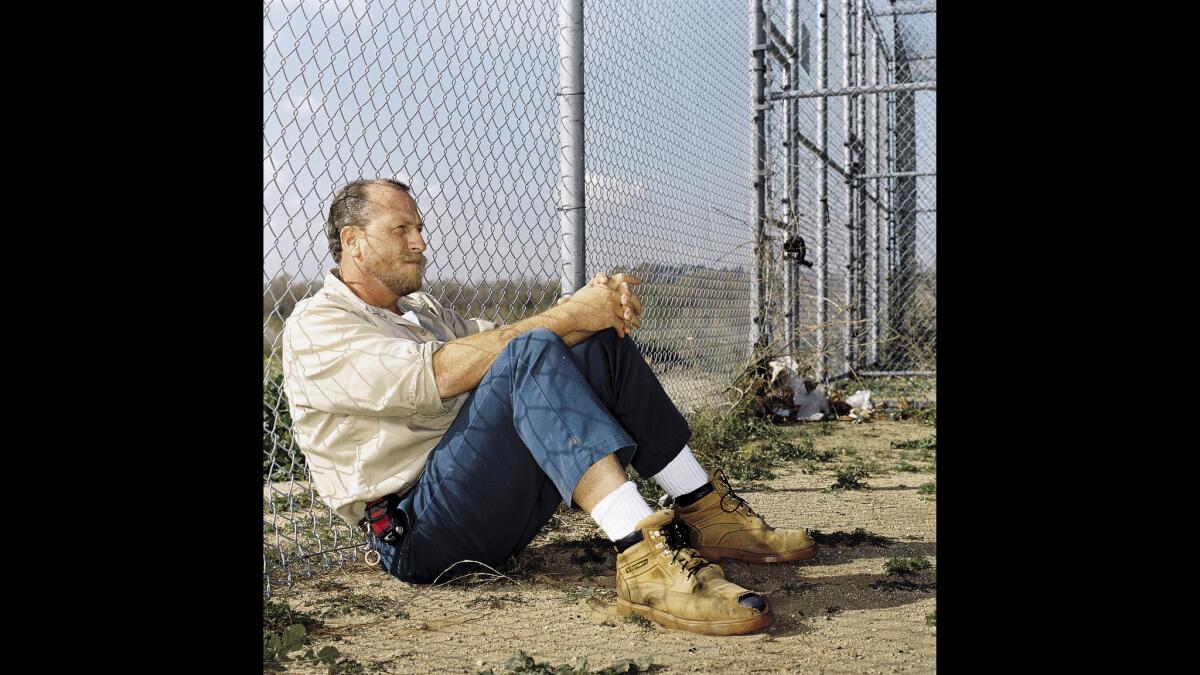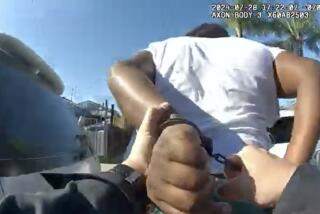From the Archives: Tape of L.A. police beating suspect stirs public furor

George Holliday, who captured the Rodney King beating on his video camera, in February 2006
A bystander’s videotape that captures Los Angeles police officers repeatedly striking a prone, apparently defenseless man, stirred a public furor Tuesday, with Mayor Tom Bradley declaring himself “shocked and outraged” by the incident, widely broadcast on national television.
The FBI and Los Angeles County district attorney’s office announced that they had opened investigations into the officers’ actions, which followed a high-speed car chase in the northeast San Fernando Valley. The Los Angeles Police Department’s Internal Affairs Division also is investigating.
The homemade video, shot early Sunday morning in Lake View Terrace, depicts at least a dozen officers surrounding the man after he left his car, kicking him and inflicting more than 40 blows with nightsticks as he lay on the pavement. The tape, shot from a nearby apartment balcony, recorded no sound.
It was first broadcast Monday night by a Los Angeles television station and was shown nationwide Tuesday by Cable News Network.
The violent images produced an immediate public outcry and brought the Police Department under intense criticism.
At a Los Angeles Police Commission meeting Tuesday afternoon, Police Chief Daryl F. Gates called the tape “shocking,” but said he would withhold judgment until the incident had been investigated.
Gates added: “One incident doesn’t indict an entire department. I would hope the public on this one case not make a judgement on the Los Angeles Police Department.”
Civil rights and police watchdog groups said the incident was only one in a string of unprovoked beatings by officers.
Bradley, along with other public officials, was unequivocal in his response.
“This is something we cannot, and will not, tolerate,” the mayor said. “It’s now a matter of our identifying and finding witnesses. . . . I assure you that once that’s done, appropriate action will be taken by the department and the Police Commission.”
FBI spokesman Jim Neilson said the bureau had decided to investigate the incident as a possible civil rights violation.
The man shown being beaten on the tape is black. He was identified as Rodney Glen King, 25, of Altadena, who was released from prison in December after serving time for a second-degree robbery conviction. Members of his family said King, unemployed since leaving prison, had been scheduled to begin a construction job Monday, the day after the beating.
Sandi Gibbons, spokeswoman for Dist. Atty. Ira Reiner, said the prosecutor’s Special Investigations Division is investigating the case.
“We want to determine if there is a criminal case (against the officers),” she said. “We’re going to proceed on this very quickly.”
New details of the incident emerged Tuesday, as police and witnesses offered conflicting versions.
At about 12:30 a.m. Sunday, King’s 1988 Hyundai was clocked by California Highway Patrol officers at speeds of up to 115 m.p.h., west on the Foothill Freeway. Los Angeles officers joined the pursuit when King left the freeway and entered surface streets, running several red lights, said CHP spokesman Sgt. Mike Brey.
Richard Talkington, Police Department traffic detective, told The Times that reports written by the officers involved said that King ignored several requests to leave his car after it was pulled over in the 11700 block of Foothill Boulevard.
Talkington, assigned to investigate the initial traffic violation, said the officers’ reports indicate that King placed his left hand in his pants pocket when he stepped out of the car--a movement that Talkington surmised heightened the officers’ concern that he had a weapon.
King finally lay down on the ground at the officers’ orders, Talkington said, but resisted being handcuffed, causing Officer Laurence Powell to lose his balance and fall.
“That’s when the fight started,” Talkington said.
King charged toward Powell, and Sgt. Stacey Koon fired a stun gun dart at King, hitting him in the back, Talkington said. Although momentarily incapacitated, King recovered and charged toward the officers again, the detective said. Powell and Officer Timothy Wind then drew their batons and struck King on the arms, legs and torso.
Talkington said King continued to kick and swing but was subdued by several officers, using a method Talkington called “the swarm technique.”
The video--shot by amateur photographer George Holliday--shows no indication that King attempted to hit or charge the officers.
Three witnesses who live in the same building as Holliday--directly across the street from where King’s car was stopped--said Tuesday that they did not see King fight the officers.
“I never saw him offer any resistance,” said Eloise Camp, 65, a retired school teacher.
Dorothy Gibson, 52, a nurse, said she saw one officer walk up behind King with two hands on his baton and swinging it like a baseball bat onto the man’s back. The witness said she could hear King pleading, “ ‘Please stop, please stop.’ “
Afterward, Gibson said the officers “were all laughing and chuckling, like they had just had a party.”
Camp and neighbor Josie Morales, a service representative with the Department of Water and Power, said they saw the entire incident and watched as King emerged from the car. At no point, they said, did they see him resist.
Police spokesman Lt. Fred Nixon offered no explanation for the incident, saying only that it is under investigation. He said that, to his knowledge, none of the officers had been disciplined, or relieved of duty.
Two passengers in King’s car cooperated with officers and were released, police said.
King was being held Tuesday for investigation of a parole violation at the Los Angeles County Jail. No charges have been filed against King.
After his arrest, he was treated at two hospitals, including the jail ward at County-USC Medical Center. Hospital officials declined to comment on the extent or nature of his injuries.
King’s wife, Crystal Waters King, said Tuesday she visited her husband for five minutes at the jail ward Sunday. She said her husband has a broken leg and the right side of his face is disfigured.
Crystal King said her husband told her he was going fast on the freeway, but that he slowed down when told to pull over by police. He stepped out of the car “and all of a sudden they started beating on him,” she said. “He said he didn’t do anything. That’s all he kept saying.
“I thought the police were supposed to protect us,” the woman said. “It was a traffic violation. Why couldn’t they just arrest him, or fine him, or something?”
At KTLA, which originally broadcast the tape Monday night, news director Warren Cereghino said the newsroom had received nearly 300 calls from viewers by late Tuesday. He said the callers responded to the tape with “total shock, anger and disgust.”
KTLA provided a copy of the tape to Cable News Network.
By any measure, it was a dark day at Parker Center, the downtown police headquarters, where phone operators were also deluged with calls from angry citizens. At the department’s press relations section, Nixon sat in his office with a stack of five videotapes on his desk--copies for senior police officials.
Police Commissioner Melanie Lomax said the incident was only the latest involving alleged abuses against African-Americans.
It is a clear case of outrageous police behavior. . . . This whole incident can only be termed disgraceful.
— Police Commissioner Melanie Lomax
“It is a clear case of outrageous police behavior. . . . This whole incident can only be termed disgraceful,” she said, adding that “beatings like this tend to result in the loss of confidence of citizens in the police. The department needs to act immediately to restore public confidence.”
Civil rights groups and police watchdog organizations--among them the National Assn. for the Advancement of Colored People, Southern California Civil Rights Coalition and Police Misconduct Lawyers’ Referral Services--joined the American Civil Liberties Union in calling for an independent investigation of the Police Department and suspension of the officers involved.
“(This) is not an isolated incident,” declared Ramona Ripston, executive director of the Southern California chapter of the ACLU. “The difference this time is that we have the proof . . . on tape.”
Samuel Paz, who serves on the Hispanic Advisory Council to the Police Commission, said that the Police Department has “routinely ignored and disobeyed” commission policies for investigating brutality complaints.
Of the video, he said: “What you’ve seen is evidence of a department’s failure in any way to prohibit the excessive use of force. . . . This is a typical street justice scenario. . . . That is, unfortunately, standard fare for the Los Angeles Police Department.”
Court records show that King was arrested Nov. 13, 1989, in the Nov. 3 robbery of a Monterey Park grocery store. Grocer Tae Suck Baik testified that King threatened him with a tire iron. King was charged with robbery and assault and later pleaded guilty to second-degree robbery. He was sentenced in February, 1990, to 2 1/2 years in prison. Credited for time already served, he was released in December.
After serving six months in prison, King wrote a letter to Superior Court Judge Lillian M. Stevens, asking that his sentenced be reduced. The request was denied.
“I have seriously been thinking about what happened,” King wrote, “and I think if it is possible that you can give me another chance, your honor, I have a good job and I have two fine kids who wish me home.”
LAPD’S USE OF FORCE POLICY
Here is the Los Angeles Police Department’s use of force policy as contained in the department’s official governing manual.
“In a complex urban society, officers are daily confronted with situations where control must be exercised to effect arrests and to protect the public safety. Control may be achieved through advice, warnings and persuasion, or by the use of physical force. While the use of reasonable physical force may be necessary in situations which cannot be otherwise controlled, force may not be resorted to unless other reasonable alternatives have been exhausted or would clearly be ineffective under the particular circumstances. Officers are permitted to use whatever force that is reasonable and necessary to protect others or themselves from bodily harm.”
Times staff writers Tracy Wood, Steve Padilla, Ashley Dunn, Sheryl Stolberg and Faye Fiore contributed to this report.
More to Read
Sign up for Essential California
The most important California stories and recommendations in your inbox every morning.
You may occasionally receive promotional content from the Los Angeles Times.










